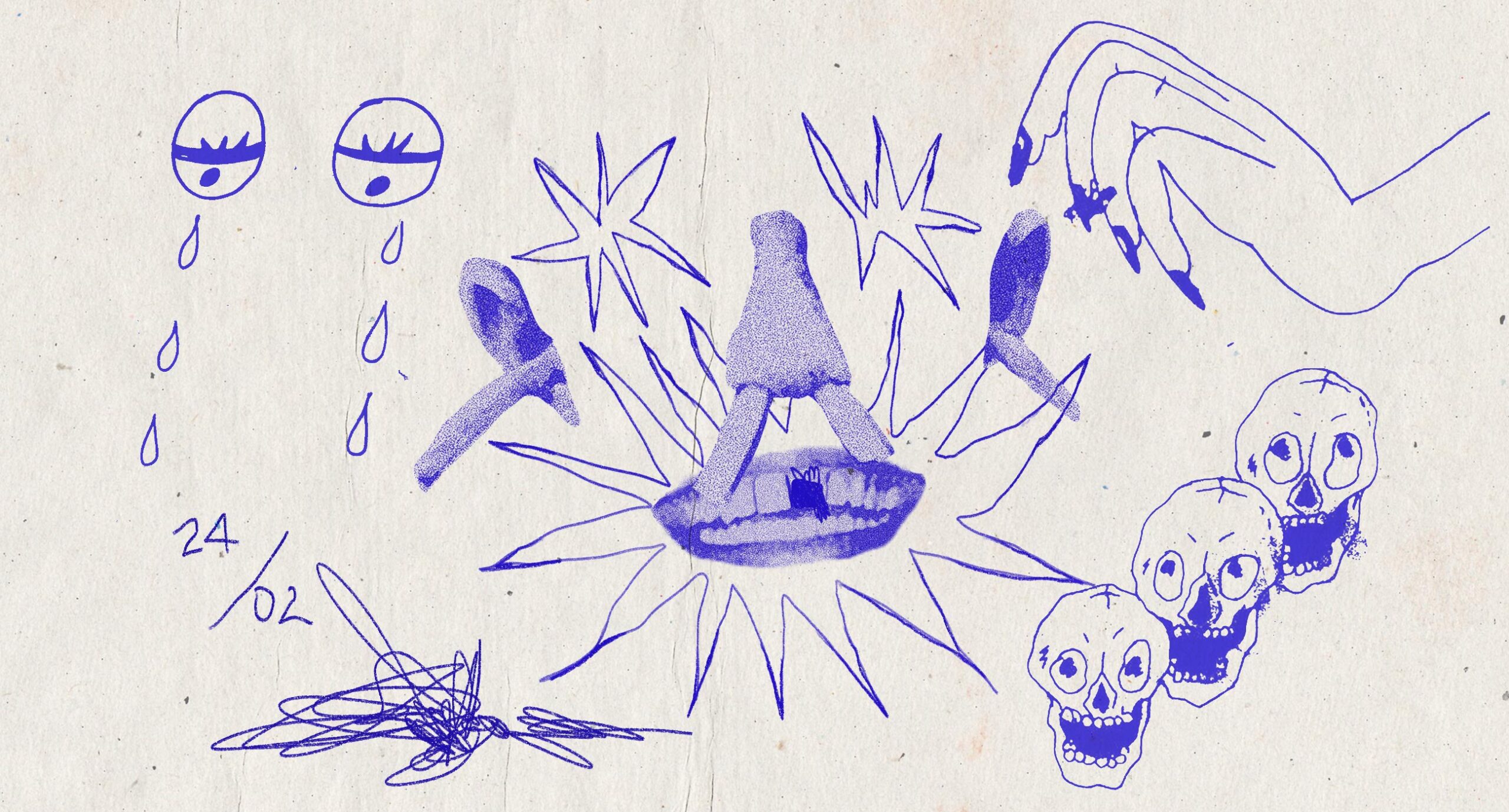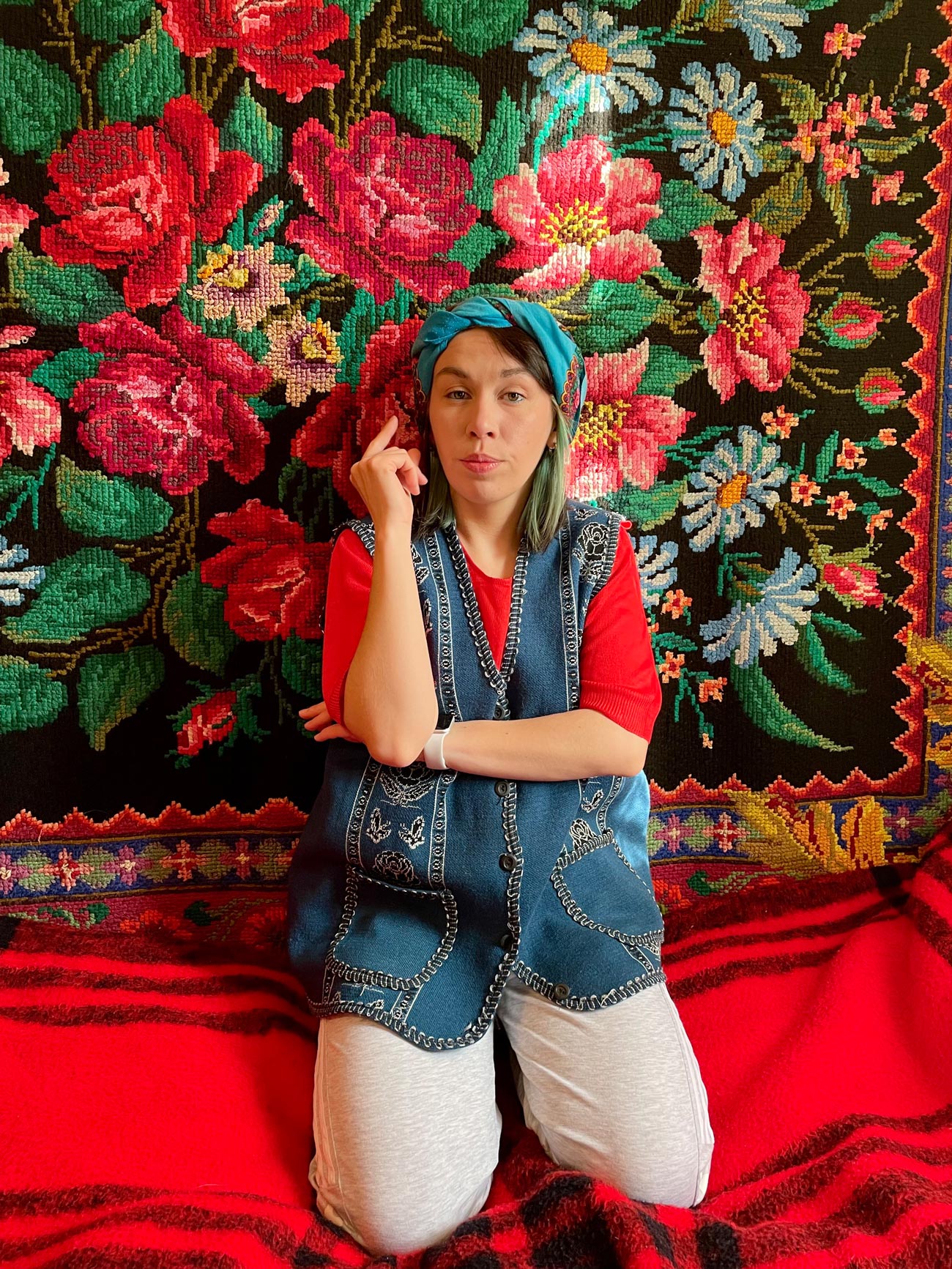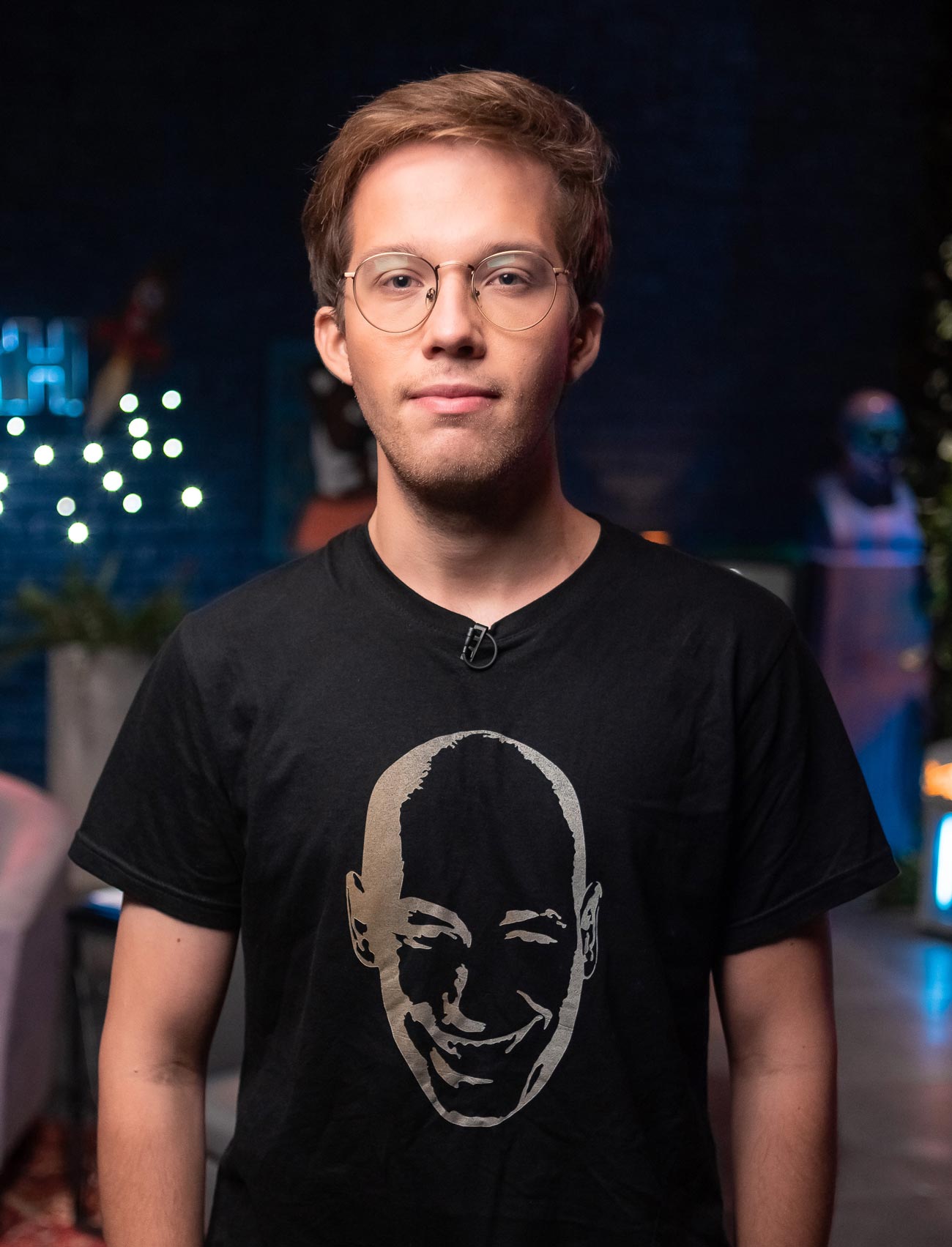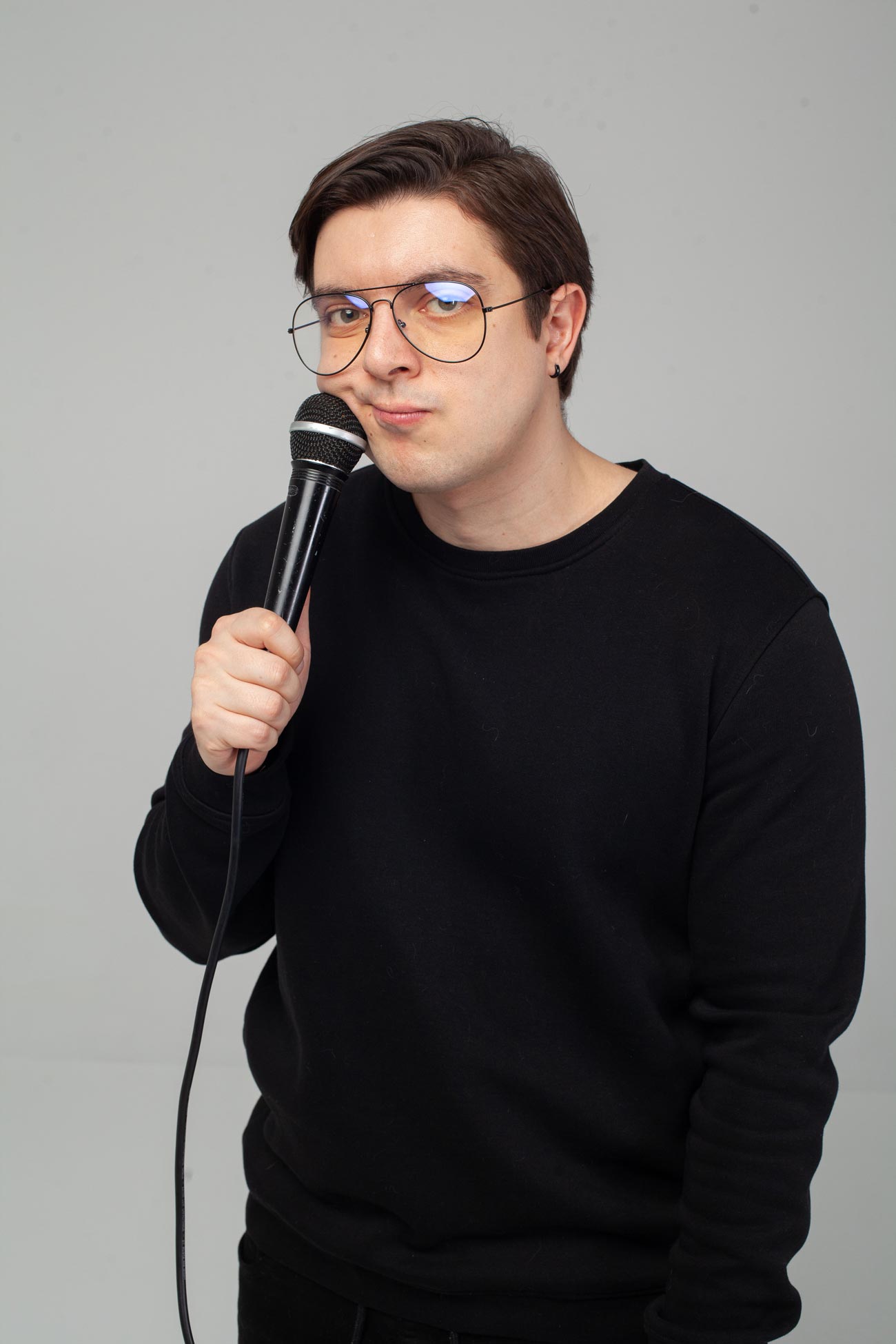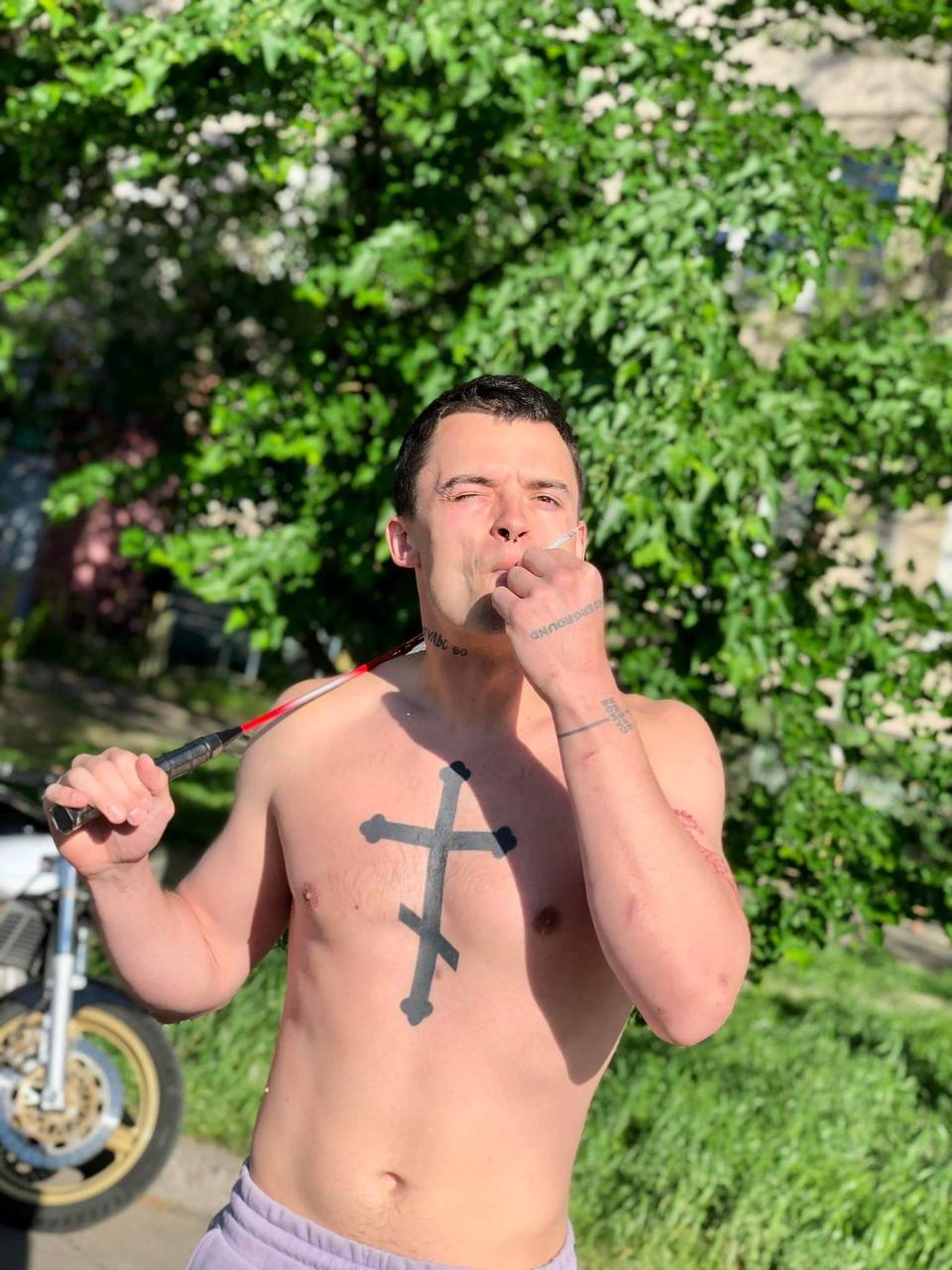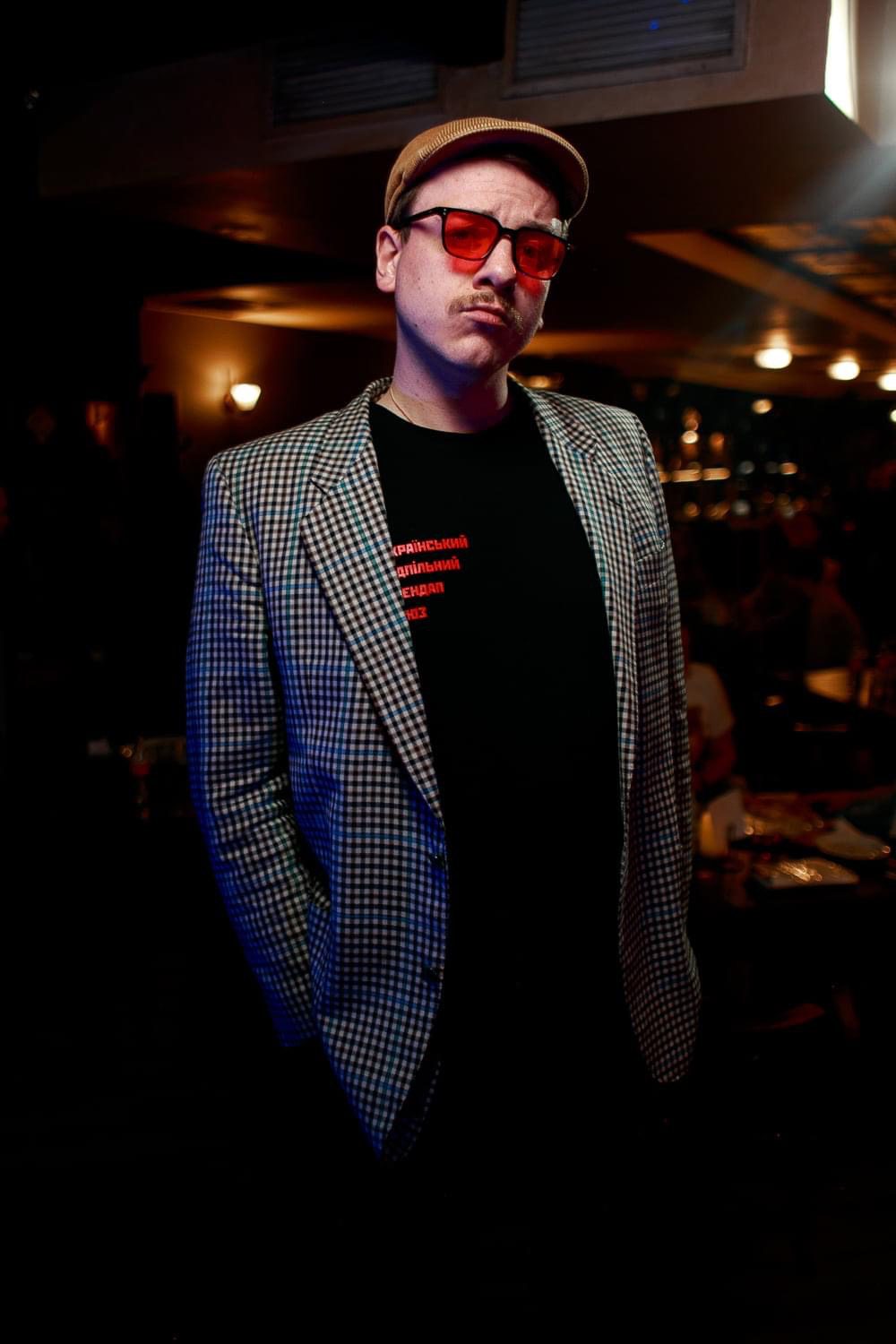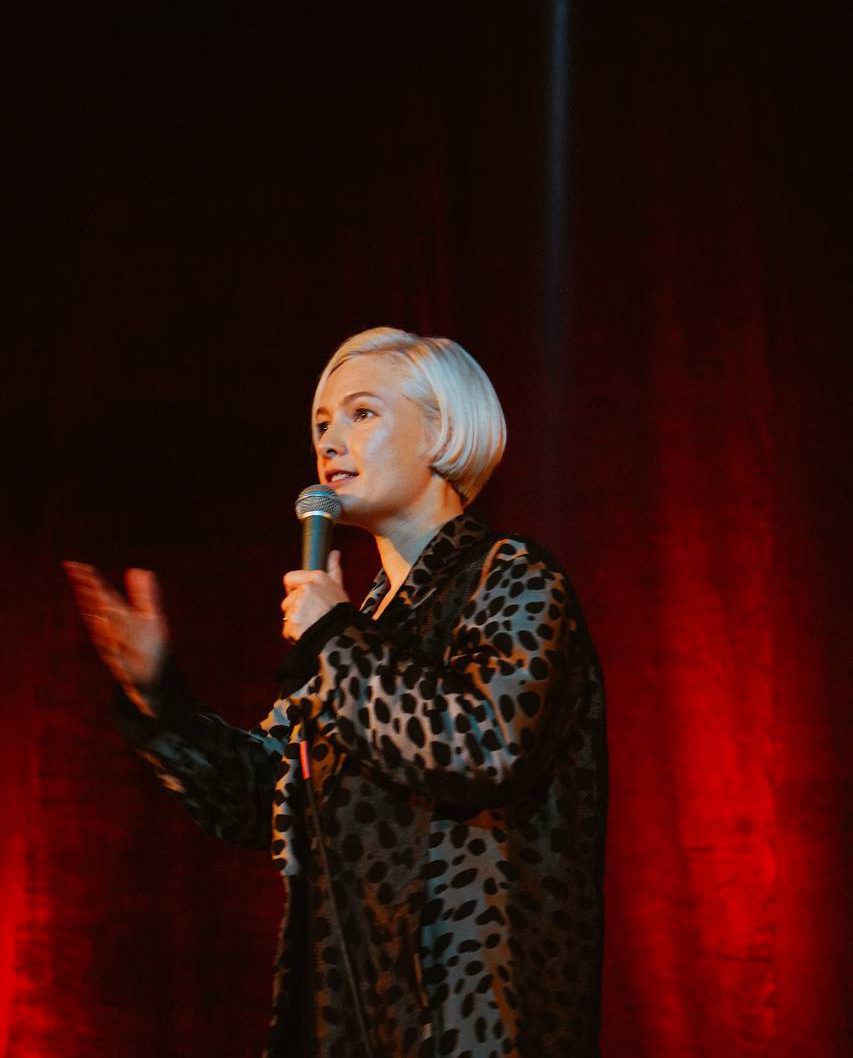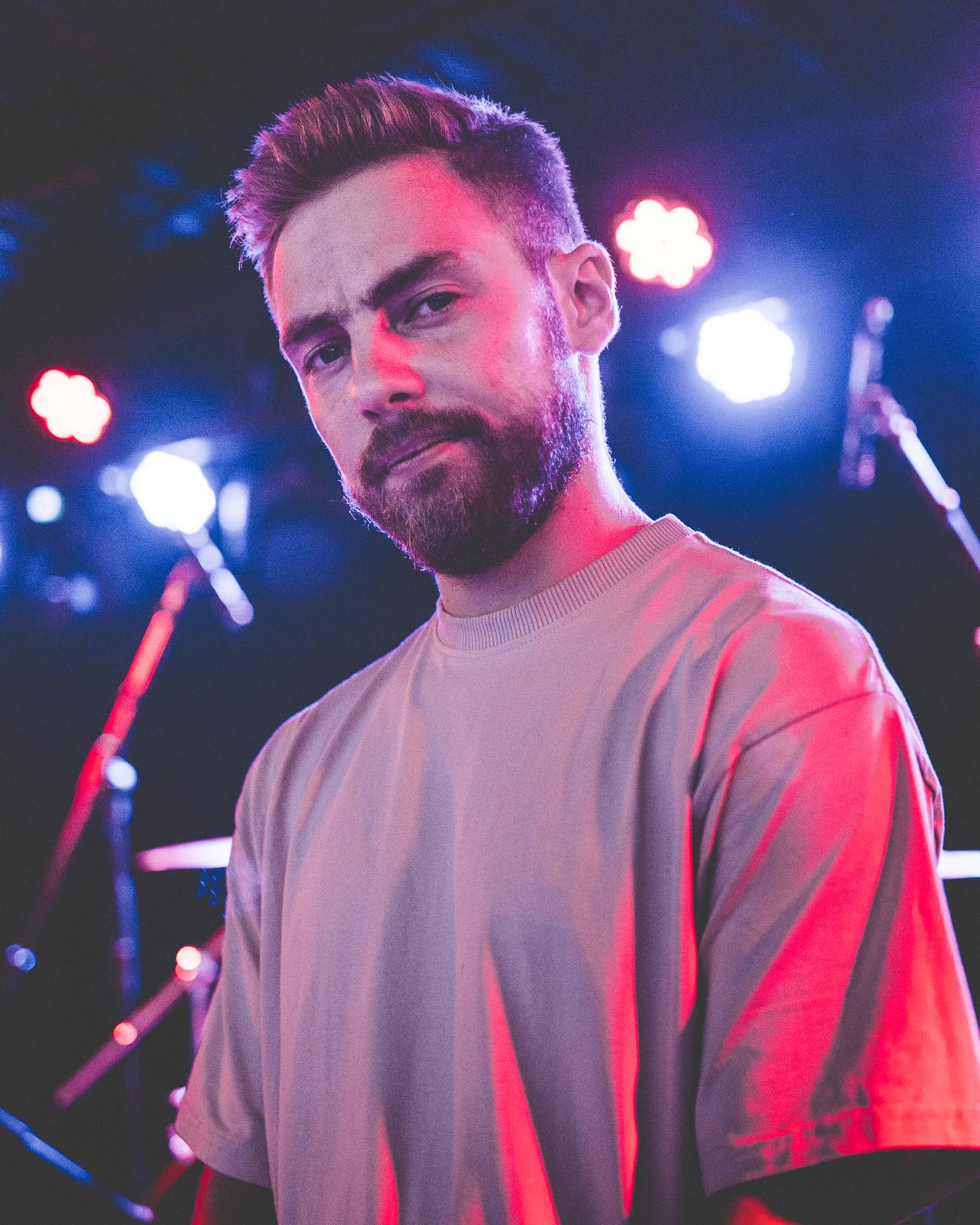When in December 2021 Zaborona asked Ukrainian stand-up comedians about taboo topics, the war in the east of the country was often mentioned in conversations. However, on February 24, 2022, the Russian war engulfed the entire country, and it didn’t destroy Ukrainian comedy, but rather nourished it. A stand-up in a bomb shelter, “loosen-up” marathons and an endless stream of jokes on Twitter reach their aim every day and make the audience feel better. However, the reaction was not always positive: the stand-up comic Oleh Hriundik had to apologize for a joke about monetary compensation to the families of the killed Ukrainian servicemen — on social networks he, in particular, was threatened to be “punched in the face”.
Zaborona editor Mariia Pedorenko and journalist Yelyzaveta Khorosheva spoke with Ukrainian comedians about how the war affected their careers, why the audience needs jokes about dead occupiers, and what pages of today’s war will never become the object of jokes.
Vasyl Baydak: “I stand for any jokes that demoralize the enemy”
From the first minute [of the war] the humor has not gone away, the direction has changed a bit. In the first two months, the war completely destroyed the stand-up genre in terms of getting on stage and entertaining people. Everyone focused on their private pages — everyone works, for example, on Instagram, lifts the mood and fighting spirit with his comedy.
For me, the military stand-up began with a performance for soldiers in Vinnytsia. Three times I performed in military units and it was there that I felt the need and power of stand-up. There is a lot of anxiety and pain right now, and today saying things that are supportive is a distraction. Not to forget about the war, but to distract yourself while at war. Humor has been a very supportive thing for both me not going crazy with these terrible things, and my audience on Instagram.
Now we are not joking about the war, but during the war. And all the jokes are told in order to hasten the victory and demoralize Russia and the Russians. I’m generally in favor of any jokes that demoralize the enemy and raise the fighting spirit and the spirit of the population, strengthening it. Of course there are taboo topics here. By no means will I joke about the great tragic cities: Mariupol, Bucha — there are a lot of them, about the things that can cause pain, trigger. I will not even build a beginning of a joke where this topic would be involved.
In general, it is very important to understand the context in which the comedian is joking about the war. If a person helps, works for the victory, supports with information and volunteering — this is a particular option. And, for example, if a comedian will joke from Italy about the war in Ukraine is a quite another matter.
I have now a piece of standup, and basically all the jokes there are my experiences. It is very similar to what many people have experienced in those times. War jokes [for me] are like a stress reliever. We experience the same thing, and humor is one way to deal with anxiety, with fear.
How can you plan your future now? My future is to do the things I have planned for today, to plan things for tomorrow, and to want tomorrow to come exactly as I planned it today. Plans for the future are now more like dreams. I dream that there will be a victory and I hope that it will be tomorrow. And so I hope every day. Of course, I plan to have a career where we will be able to go on stage, joke about how we won and how we succeeded. But these are not plans, but dreams. That’s what war and damned Russia are doing.
Nastia Dierskaya: “Writing a joke that directly ridicules Mariupol is a career suicide”
The war greatly affected both my personal and my professional life. The vector of my jokes has shifted. I’m absolutely sure that in the future I will be more interested in issues of the national idea, issues of confrontation with the “Russian world” and everything connected with this. Plus, I realized better what a big responsibility lies on comedians: within the war, we are also a weapon in the information war. It is very important what we say, what narratives we spread. The full-scale invasion has probably made me more aggressive, in the best sense of the word. Now I’m more determined and uncompromising in those issues that I consider fundamental for my country and my audience, and for our viewers in general.
It’s okay to joke about dead Russians. I reflected on this question from the very beginning of the invasion, so there was no doubt to joke about it. In these circumstances of the “extra carnage”, as I call it, Ukrainians feel hatred for Russians and this is a completely normal evolutionary pattern of behavior. I’m ready to admit that in my jokes I’m dehumanizing Russians and I consider it a counter-propaganda activity. No kidding, Russian propaganda has dehumanized Ukrainians for decades, and in the end we see what is happening now. There are people who see this as the “dark side”, but the only way for people to survive in war is to dehumanize the enemy in order to save themselves.
Yes, I have faced attempts to justify the Russians, to search for “good Russians”, with accusations that I’m not humane enough, but this is rather an exception to the rule. Among my audience and the audience of the Underground Stand-Up such claims are extremely rare and I don’t take them painfully. I understand how people came to such conclusions, but I consider their point of view completely ineffective and dangerous for them.
One viewer regarded my harsh hyperbolized joke as a call to Nazism. I said that I always wanted to do a genetic test and find out what nationalities I have in my family. But now I decided not to do this, because God forbid I find out that I had Russians in my family, and then I will have to act like a samurai. The viewer interpreted it as if I was telling people to kill themselves if they were of Russian descent. This is a classic story, when a person adds a connotation that did not fit there, ignores the ironic, humorous subtext, which can’t be read as, say, an official statement of a statesman. Indeed, in military realities, such attacks of aggression can occur, so if there are resources, I try to be patient, because all people are stressed, exhausted.
In all my interviews, I emphasized that there are no taboo topics, but there are taboo topics for a specific audience. In military realities, my vision has changed somewhat – it is correct to say not a taboo topic, but a taboo object of a joke. Conventionally speaking, joking about war is not a taboo, but there are phenomena and tragedies that can’t be the object of jokes or ridicule. For example, Mariupol is a Ukrainian national tragedy. Writing a joke that directly ridicules Mariupol and the tragedy of the people is a career suicide. This is a very delicate matter, it must be understood that there is a difference between the topic and the object of the joke. I’m sure that intuitively, the vast majority of Ukrainian comedians, simply because they are Ukrainians, will not even be able to physically write jokes about rape victims in Bucha, I think this will not happen, our society will not accept it.
The experience of war will result in many years of reflection. What every Ukrainian is going through and the tragedy we are seeing now can’t go unnoticed. This doesn’t mean that every joke of mine will be about the Russian-Ukrainian war, but it changes the tone one hundred percent, it will definitely be a different work. Now I see prospects not only in comedy, perhaps it will be journalism. We founded our Bold Battalion media, and there I found an opportunity to express myself. I understood my deepest values, now I realize them better than ever, and this is a consequence of the tragedy that we are experiencing.
Felix Redka: “Stand-up in the bomb shelter is a one-time story so as not to go crazy”
Until February 24, I was not self-confident. It seemed that I couldn’t compete with other Ukrainian comedians. I thought about what field to find myself in. For example, I opened the Dmytro Hordon merch store. I thought of working in the concert sphere, organizing performances and tours for comedians. But after the start of the war, after making a stand-up in the bomb shelter, shooting some popular videos, I realized — if even during the war I make some kind of humorous content, then it’s probably a sign — this is what I should do.
There was no taboo [on jokes about the war until February 24] — my dad is a military man. He brought my favorite joke from the ATO in 2014. When he returned home, he first dropped all the photos he had taken during the anti-terrorist operation into a separate folder. And he named the folder “Summer 2014”. Since 2014, I have always told this joke at concerts and it works best in any region.
The stand-up in the bomb shelter was made spontaneously, literally in 3-4 days. There was no influx of emotions after this performance. But a few days later, when we sat down to edit, started answering comments and saw feedback from people, we realized that we had done something really cool. There were about 120 people, we made ads on Instagram, the event was free. There were also people who go down to the shelter every day and know about its location. Someone told them that there would be a stand-up tomorrow and they came with the children, sat on pallets and watched the concert.
We joked with a clear conscience about the death of the Russians. But here is an important clarification: not just Russians, but military Russians. It was the third week of the invasion, my father was at war, people in the city were dying, there was shelling and so on. What doubts can there be about joking about the death of people who bring death to your home? There were no threats, perhaps only from bots or Russian citizens who wrote negative comments on YouTube, but I don’t pay attention to this, as something serious.
The topic I can’t joke about is the death of Ukrainians. About everything else — no problem. We don’t like the mayor, so during the abduction of mayors in the south [of Ukraine] I joked that, thank God, maybe ours will be abducted too.
The stand-up in the bomb shelter is a one-time story. Just for people to distract a little so as not to go crazy: we have to perform; people have to go out somewhere. It was three weeks of staying at home, in the basement and in the news. And so people came to a cool Soviet bunker, sat and took pictures, laughed with other people, felt the taste of pre-war life and went home. It was necessary for emotional relief and seemed to succeed.
I see my future career in Ukraine. I will create content for the channel and give concerts. The topic of the war with Russia will be popular for a long time; just later the audience will have a request for higher quality content.
Dmytro Polishchuk: “The ability to shut up in time has become a separate art for comedians”
Because of the war, I dropped out of life for a while, and there was no talk of any kind of work, let alone a comedy. I was not up to it. I started to come to my senses and think about the stand-up in about one and a half to two months, and it became clear that there would be nothing more relevant, important and interesting than the war in comedy. I don’t think the style of humor has changed much. Topics, context, and perhaps jokes have changed to blacker ones in response to events and information.
Jokes about death are one way to deal with stress or get through some events. Joking specifically about the deaths of Russians is also a way of spreading certain information and expressing one’s position on events, people and phenomena.
I think every comedian decides for himself what to joke about. I consider myself a person who does not have taboo topics, but you should always remember the context, position and purpose for which you want to joke or tell something. For example, you can share your experience of how you met the morning of February 24, you can tell about your father, who during the air raid siren stands in shorts by the window so as not to miss anything, or about how stupid it was to decide to go to live in the same house with all relatives. Unfortunately, even such jokes can offend someone, because everyone perceives them through the prism of their own experience, as it actually was before the war. Therefore, it would be a mistake to ignore or taboo certain topics.
There are no forbidden topics for me during the war, but I will not joke about everything in a row — I don’t see anything funny in many topics and I’m not going to look for it. I’m sure that devaluing things, trying to joke or hype on “hot” topics is, to put it mildly, a bad idea. Even before the war, stand-up often resembled a walk in a minefield, but now the ability to shut up in time has become a separate art for comedians.
War jokes give viewers the opportunity to unwind and exhale, at least to distract a little from the terrible reality and look at things from a different angle, hear about someone else’s experience and compare with their own. We often joke about what hurts us the most and it would be much harder to endure if we didn’t turn it into a joke. Sometimes in social networks you can see messages: “How can you joke about this and generally hold stand-ups, we have a war!”. It seems to me that this is said by people who simply experience stress differently, due to anger or introversion, and do not understand that it does not suit everyone. Well, or they’re just from Facebook.
After the war, I think, only the topics of jokes will change. Now it is the war and the dead Russians, then it will be the victory, the fate of Putin and Russia. There is something to work on. Maybe I will become a little more popular because comedy will become more in demand in difficult times. Well, and because the Ukrainian audience will stop consuming the Russian stand-up and will pay attention to their own. At least I hope so.
Andriy Shchehel: “Content is like gasoline — it’s always valuable”
The war had no effect on my humor. I’m fucking working according to the program — I make fun of everything I can. The war gave me some crazy time — I returned from Poznan to Ukraine on the fourth day of the war. Me and my bro Vlad Kapitsa, with whom we make the SRAKADUPA podcast, took the equipment, bought a car, and he drove 10 thousand kilometers in Ukraine without any driver’s license. We made a tour — we traveled to 17 cities. We made great content, got some moolah, our channel grew by about 25,000 people, our Patreon already has a $ 4,800 subscription every month, we have a shitload of popular videos, 83,000 TikTok subscribers, 2.2 million likes, and we are very popular there.
Everything is as usual: we are the cool dudes, we act like honest and talented people, we monetize what is happening in our lives; and coppers are faggots. So I’m going to tour 19 cities now, make some money, save it, and as soon as the borders open, I’ll get the fuck out of here!
On May 20, I’ll visit the first city of the tour — Kyiv, and on June 2, the last one will be Cherkasy. The hottest city where I will perform is Netishyn — because of the Khmelnitsky NPP located there. I offered the guys from SRAKADUPA to give a concert in Kharkiv, but we didn’t get around to it. If there was an ideological person who would organize this, I wouldn’t suck, I would visit the city. Because I doubt it would be dangerous, and I will die there.
Content is like gasoline — it’s always valuable. I don’t give a fuck what it gives them [the audience]. I offer — and they buy. I’m an artist, I do what my experience and intuition tell me. That’s all. You don’t know how it will affect them: will they unwind or, conversely, frown. We are interested in what we have always done. If there is a request for it, we will always do it in the best and most interesting way.
Shchegel’s colleague comedian Denys Duma joins the conversation:
We don’t consider stand-up comedy as separate phenomena before and after the war. We’ve been doing something for eight years, and we can’t stop because of the war and letting down the people who have been with us all the time. And those who make stand-up and emphasize: “Look, we’re doing something here during the war” — it seems a speculation to me. What made you better than others — just this performance in wartime? The doctor, who worked during the coronavirus pandemic and now continues to work, doesn’t cock his nose, even during the Covid he traveled in his ambulance and worked. You have to work too, because you have already promised people.
My only joke about Russians is: “What do Russians say when they run away from the battlefield?” I portrayed Asians who say with a shitty accent: “Oh, they’ll hit us fucking hard now!” I don’t have malice towards Russians — I feel sorry for all the victims of this war, all those involved in this war. The victim has no nationality or citizenship. For me, the world is colorful, not monochrome. I’m one of those dudes who stand for all the good and against all the bad. Here’s a jerk from Samara involved in the war, who says to his relatives: “I’ll send you a washing machine. And I killed a civilian yesterday.” Of course, this man is a criminal and an incredible bastard. But it is the same victim of poverty, anger, lack of culture, education and anything else as many of us.
Honestly, I don’t even tell jokes about the war. Now I will go on tour, with not a single joke about the war. I don’t live by war — I got off this topic. For I’m an egoist, an individualist, and I always had more claims not to something foreign, but to the local things. The war, like no other historical time in our country, exposed this motherfucking stupidity. I don’t want to live by it or its manifestations. I always tried to be out of the crowd and the hype, context and current events to design my own agenda. And this [war] is no exception. It’s an underground, goddamn it!
I see myself as the center of my life, and I don’t give a fuck where am I going to get moolah for this. I can deliver pizza, as long as I’m not knackered by any rag-assed copper. If I continue to write jokes [after the victory], the topic of war will surely catch up with me.
Sviat Zahaykevych: “The idea of what the bastards Russians are will be a tool of humor for a long time”
I don’t think I’ve changed much as a comedian professionally. For me, the main thing in stand-up comedy is sincerity and openness, they still remain unchanged. I had very tough jokes before the war, but now most of them are adapted to the topic of dead Russian. The purpose of such jokes is to relieve tension in the viewer. Everything that he sees in the news feed all day long accumulates inside, it is the comedian who relieves this tension with a well-aimed joke, so there was no doubt.
I didn’t get any hate from my jokes. You need to understand how and what you are joking about: texts about stupid and dead Russians, about our realities work well. Jokes about the tragedy of the Ukrainian people are unacceptable; every adequate comedian understands this, so I didn’t have failed jokes.
After the war I will, as usual, joke on topics that have a response from the audience. After the victory, I think, the topic of war will be still relevant for some time, and later everyone will move away from it, but no one will ever forget what the bastards Russians are, and it will be a tool of humor for a long time.
Jokes about the war were not taboo, but I didn’t have many of them until February 24. The main paradox of today’s stand-up is huge number of jokes about the war to relieve tension, but [we need] jokes about something else so that the viewer can be distracted and not think about invasion for a while. It is on this balance that successful stand-up is based today.
Natalia Haripova: “All the jokes that were before the war were reset to zero and lost their meaning”
The first month of [the war] was scary and nervous. But when I saw some jokes in the social networks, I laughed and it made me feel better. Then I realized I had been doing this all my life — joking and cheering people up. So I have to try to joke now. And so I started writing stand-up comedy.
My first scene was in Bratislava [Natalia left Ukraine in early March]. They have a very cool Ukrainian community — I felt like I was at home. I came there with jokes that I didn’t try to tell anywhere. People came in, and I understood what things hurt them, what makes them laugh, makes them proud, causes tears, what is very funny, because it is revenge, and it makes them feel better.
All the jokes that were before were reset to zero and lost their meaning. There is a story about how I gave birth — it still works for me, because in the war I’m still with a child. Of my three solo performances, there are 20 minutes of old material left that are alive for me. And all the other material is about the war: about what the refugees should do, about shame for whom we are at war with in terms of intelligence, about Russians who believe everything on TV, about Putin, who cleanses Ukraine of neo-Nazis. And that this is my second war in my life — because I was already in the war in Transnistria.
Stand-up concerts usually have a very warm audience of 80-100 people. But the “Good evening, we are from Ukraine” performances gathered from one thousand to two and a half thousand viewers. And people are waiting for this to make their lives easier for at least an hour or two. They come to laugh, to sing with their favorite artists, just to be among Ukrainians — in an environment where everyone will be glad to see them. When you have the opportunity to cry and laugh together, it’s incredibly unifying.
Previously, stand-up for me was when I came, made people laugh, and went home. Now it’s not about having fun, it’s about talking on what concerns everyone. Not just women, women with children, men, but all of us, our entire nation scattered across Europe. I understand that I have the most important concerts in my life now. Because a peaceful comfortable stand-up is in the past. I never wrote a political stand-up before the war, but now I understand that I can be a mouthpiece for my country in Europe. It is very important.
I’ve always had a very tough and aggressive approach, and now that I’m talking about the war, it’s like two pieces of a puzzle coming together. We can’t talk about war peacefully. In general, now for me as a person, as a stand-up comedian, as a volunteer, my main engine is anger. It’s all about anger, but I’m not the only one who’s outraged by what’s happening now, so it all reaches people.
You can’t joke about grief — there is a lot of it now, and we must, on the contrary, relieve this nervous tension. Therefore, we can joke about the enemy, about all the Russians who support the enemy. I don’t have jokes about treason or Arestovych, because I trust the authorities, trust our country, and I really believe that everything will end thanks to the Armed Forces of Ukraine, the president and everyone who works in these difficult areas. We are at war with the inadequate people who don’t follow any rules.
You just have to believe. This is when you watch football and are like this: “Damn, you should have played from the third flank! What the idiots!” That is, the team of players is either idiots or cool — depending on whether they won or not. The same thing is happening now: when we win, we are cool. And as soon as something incomprehensible happens, everything is bad at once. But we can’t separate now, we have to be together, help, volunteer. This is our only mission in the rear. So I only joke about the enemy.
Today I’m very different from Natasha Haripova from February 23 — these are two different people. I don’t know what to expect from myself, because we are now working on the verge of our capabilities. 80% of volunteers need help. The military has a rotation, and volunteers work every day. This is real work, where you give yourself completely. I have it mixed with the standup, and I understand that I’m starting to burn out. I want to believe that we will soon win, return home and we can take some kind of vacation. It is not necessary to go somewhere — I have already had these trips — just to be alone, to understand who you are now? We have all changed. We will have a peaceful life, we will have a peaceful stand-up, but we are all on guard now.
Anton Tymoshenko: “It is the choice of Russians that I joke about their death”
I wouldn’t say that the war somehow changed my style in stand-up. I used to love ‘black’ jokes and joked a lot about politics, so now I’m in my discourse. It just became much harder morally to write jokes, as if you had to joke about the war and forget about it at the same time, or twist the bad into the good. You can’t always recall Mariupol and some horrors of war, you try to find something funny and thus forget something bad. ‘Occupational bipolar disorder’ is what it looks like now.
Jokes about the death of Russians are what this world needs now. The Russians and their army are a new strain of the coronavirus, so it is clear that stopping it will lead to the prosperity of the planet. It is the choice of the Russians that I joke about their death, not my choice.
I differentiate taboos in stand-up comedy like this: I write jokes about what I know a little, what I have some personal experience in. For example, there were some jokes about the Maidan because I participated. I almost didn’t joke about the war in Donbas, it was about the LNR / DNR football teams, because I know a little bit about football, but not about the military — I wasn’t in their ranks, I have no experience and it’s hard for me to joke about what I didn’t feel and don’t know — it will look kind of clumsy. Now it’s hard for me to joke about Mariupol, I can’t do it. Taboos vary depending on the experience the comedian has had.
Failed jokes are part of the job of a comedian, they come up with some material, something is not funny and they throw it away, but leave the funny parts. There didn’t seem to be a negative reaction [to jokes about the war], one or two comments could slip through the 500 good ones, so I don’t think it’s worth paying attention to. People come to stand-up to take a break from the war, but the war continues, so it’s hard to just forget about it, it’s better to laugh in the face of your enemies, of your fears — so they like it. People respond well to jokes about the death of Russians and the future destruction of Russia, you can even jokingly tell people your thoughts or dreams about its destruction and they respond well.
For many years there will be jokes about the war, then post-war, then rethinking these jokes, rethinking the events, what will happen to Russia, to the world in general. The results are very important in the stand-up, and now it is difficult to sum them up. Even the British intelligence doesn’t know how it will end — how do I know? That’s why it’s hard to finish your stand-up with some thought, everything can change literally tomorrow. There is no such thing as wanting to get rid of military issues in the stand-up as soon as possible, I’m writing about what I’m living in, and this experience will definitely not be finished after the war. Maybe I will think about these events for the rest of my life.
This is how I see my stand-up future: Ukrainians have a lot of money after the war, we make a concert, they bring us a lot of money, and comedians earn billions of hryvnias. For these billions of hryvnias, I’m rebuilding Ukrainian cities and building new cities. I go on a tour to the city, earn a lot of money there and build a new city, where I come again with a concert, and so on indefinitely, until I go around all the cities of Ukraine, rebuilding them and making citizens laugh. I also sometimes travel around Russia, these are humanitarian tours where I perform in Ukrainian and people who come to my Ukrainian concerts in Russia have the opportunity to get a loaf of bread and a glass of water, so they have to go to my concerts and listen to me humiliating their country and dignity. I also start performing in English more and more, after the war I’m invited to the “Late Night Show”, where I meet Amber Heard, we have an affair for about three months, then we divorce and she sues me and gets a house in the village of Menzhynske.

